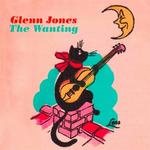
Glenn Jones The Wanting
(Thrill Jockey)
With the tragic death of Jack Rose in 2009, the heir apparent of John Fahey in the world of instrumental acoustic steel-guitar became unexpectedly uncertain. Rose, while still alive, surely was the crown prince. His albums extended beyond the hackneyed folklore/primitive metaphors that constantly irk the music (the music has as much to do with folklore as the pianoforte does, and the pianoforte has nothing to do with folk music.) His playing sometimes reached anxious and acidulous climaxes, he attacked his guitar in dizzying mantras fueled by a throbbing dronelike repetition, and like Coltrane, he borrowed heavily from Indian music. In short, Rose gave us a few albums that glimpsed what instrumental guitar music could evolve into. Listening now to Cathedral Et Chatres, the third cut on Kensington Blues, I'm stunned by just how pretty he sounded. Son of a gun, it's beautiful.
Glenn Jones, described by Boston Globe as “the best guitarist you never heard of,” was friends with Fahey for over twenty-five years, and befriended Rose. (There's a DVD out called "The Things We Used To Do” that features Rose and Jones playing in a Brooklyn loft together.) “Best guitarist you never heard of” is pretty accurate: he's only been releasing solo guitar music for the last five years. He's part of a so called “Takoma School,” which is roughly a group of guitarists who play in the style of Fahey. Since the 90's he's played in the Boston band Cul De Sac, which collaborated with the legendary Can singer Damo Suzuki in 2004. Now he's released The Wanting on Thrill Jockey.
Is it different than Fahey? How about Basho? What about Rose? These are the questions that popped up while I was listening. But why? Truth is, you can only do so much with instrumental guitar – be it six-string, twelve-string or otherwise – before it starts to feel unfleshed, before the songs sound like variations of each other. Sure, sometimes technique can give the impression that you've sold your soul to the devil for supermusician skills, but virtuosity is not what the music is about in the first place. The music, metaphorically speaking, is about painting a picture like a still-life, or describing a period of time, like a short story. It's pastoral without being that all romantic about it. But even better is when, like what Rose did on Raag Manifestos, it stops the flowery bullshit and goes into uncharted, cartographer-unfriendly territory. Jones has yet to do so.
I'm going to admit right here that I've been playing the acoustic guitar for twelve years and am not a big believer that it can convey emotions with any kind of efficiency, even if you have the skills that Jones has. I noodle around infrequently with my ax – my style orbits somewhere between Jimmy Page and Mary Halvorson, depending on my appetite. What I know from playing guitar are two things: most of what non-guitarists think is “technical” is actually easier than playing “Twinkle Twinkle Little Star” on the piano, and there are two types of acoustic guitar songs: a meditative one and a joyful one. There's nothing all that bad about Jones style; he sounds controlled, his compositions modulate from major to minor and back again, and the final track, the seventeen minute monster The Orca Grande Cement Factory at Victoryville fools around with tape noise. But he never gets beyond either producing a meditative song or joyful song. The difference between this album from all the millions of other acoustic albums out there? Not much.
I'm guessing that Jones still can't get the Fahey influence out of him (Rose too cited being called a “Fahey clone” numerous times). Sure, he doesn't approach the guitar from a traditional angle, but what's the traditional way to learn the guitar anyway, getting a Ph.D in Guitar Performance from Harvard University? I have a love-hate relationship with instrumental-guitar – the bedroom music of paradise – and so to with The Wanting. While it's nice to appreciate Jones' unique banjo-work on “The Great Swamp Rout,” his plucked harmonics on “My Charlotte Blue Notebook,” or the contemplative mid-summer's day mood of “Of It's Own Kind”, it all sounds kitschy, like it could've been written for the Fantastic Mr. Fox soundtrack and no one would have batted an eyelash.
Jones should either go to Brazil and pay a visit to the mastermind, Egberto Gismonti, (who know doubt lives in a cave, with Jodorowsky-esque midgets surrounding his awesome display of more than two thousand types of guitars) or do something more level-headed: fool around with noise more often, or echo...maybe process his guitar through some sort of machine. Or maybe not. Maybe his music relishes on how simple it is, how untethered it feels. But who wants to feel relaxed and all smothered in steel-string lovingness for so long? Not me. I'm gonna have to pass.
14 November, 2011 - 04:01 — Michael Iovino